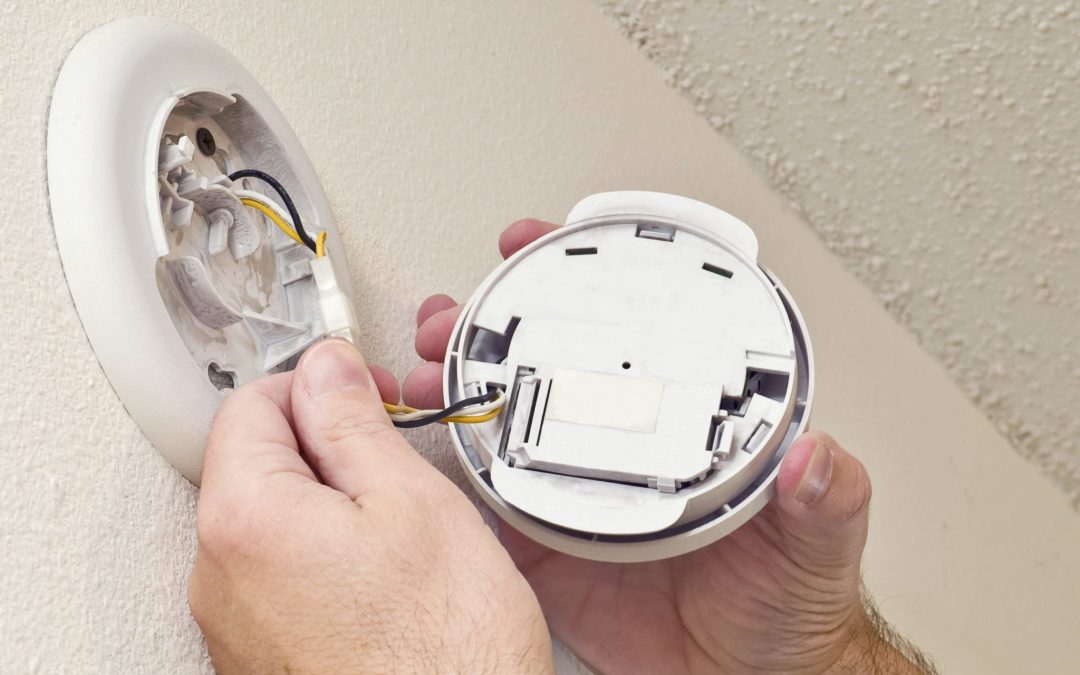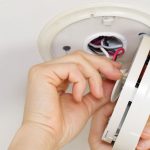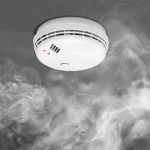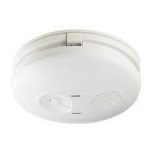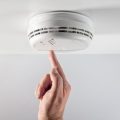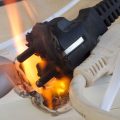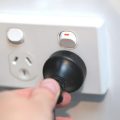Not too bothered about smoke alarms? There are a couple of things you need to know right up front. First, they keep Queensland families safe, because properly installed and maintained smoke alarms have been shown to slash the risk of death in house fires by more than half. But there’s something else you need to know all about: photoelectric smoke alarms.
Should you have photoelectric or ionisation smoke alarms?
The photoelectric smoke alarm was a huge technological leap forward. Unlike the ‘normal’ ionisation alarms we all became used to, photoelectric alarms are a LOT more responsive to smouldering fires – which are really common in residential settings. Realising how effective this tech was, the Queensland government implemented strict legislation mandating the installation of photoelectric smoke alarms in all homes.
What are photoelectric smoke alarms?
Photoelectric smoke alarms work by springing into action when they detect even a single smoke particle or three. Basically, the technology ‘sees’ the tiny particle with the help of a light beam positioned at just the right angle. When smoke enters the detection chamber, it scatters the light, which then hits a sensor and sends that alarm into SCREAM mode!
As we’ve mentioned, these alarms are so much better than older tech at detecting dangerous smouldering fires, like those caused by:
- Overheating electrical wiring
- Faulty appliances
- Slow-burning furniture or bedding
- Fires within walls or in ceilings.
So, compared to the outdated ionisation smoke alarms, photoelectric alarms:
- React faster to smouldering fires, giving you more time to escape
- Are less prone to false alarms caused by cooking or steam
- Are now legally required in Queensland homes, replacing ionisation alarms completely.
Queensland’s smoke alarm laws: What YOU need to know
As we’ve already hinted at, the Queensland government saw the light in terms of how great photoelectric smoke alarms are. And with that realisation came super-strict new regulations.
In a nutshell, here’s what a homeowner just like you needs to know right now:
1. All smoke alarms must be photoelectric
You can consider those old ionisation smoke alarms to now be BANNED – meaning they need to be replaced.
What you need to replace them with must comply with Australian Standard AS 3786-2014. And be aware – combination photoelectric/ionisation alarms are NOT permitted.
2. All smoke alarms must be interconnected
The photoelectric element is just part of this story – because your smoke alarms also must now be fully interconnected.
Interconnection means that when one alarm goes off, they all go off! It ensures that everyone in the home is definitely and immediately alerted – no matter where that fire has broken out.
Interconnected alarms can be:
- Hardwired to the mains power supply
- Linked wirelessly using radio frequency technology.
If you have standalone (non-connected) smoke alarms, here’s some bad news – you’ll need to upgrade them to interconnected models before the deadline.
What’s the deadline, we hear you ask?:
- For all existing Queensland homes, it’s 2027
- For new homes and major renovations – the deadline has long gone!
- For rental properties and homes being sold – the deadline has long gone!
3. Placement of smoke alarms
So, to now comply with Queensland law, your photoelectric smoke alarms must be installed in specific locations:
- Inside every bedroom
- In hallways that connect bedrooms to the rest of the house
- On every level of the home, even if there are no bedrooms
- If your home doesn’t have a hallway, alarms must be placed between bedrooms and other living spaces.
4. Power supply requirements
Queensland’s legislation also specifies how smoke alarms must be powered.
All of your smoke alarms must be:
- Hardwired to mains power with a backup battery, OR
- Powered by a non-removable, 10-year lithium battery.
If your current smoke alarms run on replaceable 9V batteries, they are non-compliant and must be replaced.
What happens if you don’t upgrade?
Remember in #2 when we outlined the deadlines? For many of you, that could mean that your existing setup – even if you’ve got fully-functioning ‘normal’ smoke alarms all set up, even interconnectedly – is already completely ILLEGAL.
Failing to comply with Queensland’s strict photoelectric smoke alarm laws can result in serious consequences that you definitely want to avoid!
Home Sales Can Be Blocked: Buyers will require proof that a property meets the legal standard before purchasing.
Fines & Penalties For Landlords: As part of electrical safety, rental properties must already comply, and failure to upgrade could result in legal penalties.
Higher Fire Risk: If your home lacks interconnected photoelectric smoke alarms, your family has less time to escape in an emergency.
Photoelectric vs. Ionisation smoke alarms: What’s the difference?
Some of you may still be wondering: Do I need a photoelectric or ionisation smoke alarm? Well, here’s how they shape up:
Photoelectric smoke alarms are:
- Best for detecting slow-burning, smouldering fires
- Less prone to false alarms from cooking or steam
- Now legally required in Queensland, meaning they must be installed in all homes.
Ionisation smoke alarms are:
- Mainly sensitive to fast-flaming fires, such as grease fires
- More likely to trigger false alarms, leading some people to disable them
- No longer allowed under Queensland law – meaning you need to get rid of them and replace them!
If your home still has ionisation smoke alarms throughout, here’s the really bad news – they must be replaced with photoelectric smoke alarms before the 2027 residential deadline.
How to ensure your home is compliant
Just want your home to meet Queensland’s smoke alarm requirements? We’ve laid it out in 2 simple steps:
1. Check your existing smoke alarms
- Look at your current alarms and check their type and installation date
- If they are older than 10 years, they must be replaced
- If they aren’t photoelectric, they must be upgraded
- If they aren’t interconnected, they must be upgraded.
2. Hire a licensed electrician for installation
Because Queensland law requires hardwired or lithium-battery-powered alarms, compliant smoke alarm installation in Brisbane and beyond should always be handled by a professional electrician – also for compliance!
A licensed electrician will:
- Inspect your home and recommend the best locations for alarms
- Install interconnected smoke alarms that meet legal requirements
- Test the alarms to ensure they are functioning correctly.
3. Test & maintain your smoke alarms regularly
Even the latest and greatest smoke alarms require regular testing and maintenance.
- Test all alarms monthly to ensure they sound correctly
- Vacuum or clean alarms every six months to prevent dust buildup
- Replace backup batteries annually, unless using a sealed 10-year model.
Keeping your smoke alarms in top working condition is essential for your family’s safety.
Need help upgrading your smoke alarms? Call us!
Queensland’s strict smoke alarm laws are designed to save lives – but we fully understand that ensuring compliance can be confusing and overwhelming.
That’s where Static Electrics can help.
We offer:
Professional Smoke Alarm Inspections: We check if your current alarms meet QLD regulations.
Expert Installation: Our licensed electricians install fully compliant photoelectric smoke alarms.
Interconnection Setup: We ensure your alarms work together seamlessly, keeping your family safe.
Ongoing Maintenance: We test, service, and replace alarms when needed.
So don’t wait until that looming 2027 deadline. And if your particular circumstances mean that the deadline has long past, you absolutely NEED to upgrade your smoke alarms TODAY!
Reach out to Static Electrics right now to book your smoke alarm check and/or installation – to ensure your home is fully compliant and your precious family is always kept safe.

